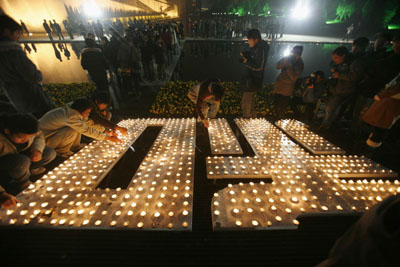'Nanjing massacre never happened', says Japan filmmaker
Updated: 2007-12-14 20:54
Tokyo - Japanese must spread the word that they committed no massacre at Nanjing, a film director told a symposium on Friday, a day after China marked the 70th anniversary of the incident in which at least 300,000 died.
 Visitors place candles to create the Chinese character "peace" in the new section of the Nanjing Massacre museum, as part of a ceremony marking the 70th anniversary of the Nanjing massacre in Nanjing December 13, 2007. [Agencies] |
Satoru Mizushima's new movie, "The Truth About Nanjing", premieres in January. It is an attempt by Japanese nationalists to counter a series of foreign films, made to coincide with the anniversary, which tell off the carnage which followed the fall of the city to Japanese invaders in 1937.
One film has been shortlisted for a documentary Oscar.
For many Chinese, how Japan remembers the Rape of Nanking, as the city was then known in the West, has become a test of how contrite Japan is about its brutal occupation of much of the country from the 1930s up to 1945. Seventy years on, the two countries still cannot agree on what happened.
"There is one indisputable fact: there was no massacre at Nanjing," Mizushima told an audience of mostly elderly men after they had stood to sing the national anthem. "We don't want our children to grow up thinking Japan is a barbarian country."
A preview of the highlights of the film, which is backed by ultra-conservatives included newsreel footage of Japanese Imperial army officers entering Nanjing on horseback while soldiers stand to attention.
"The entry of the Japanese military brought peace and order to the people of the city," read the subtitles.
Japanese veterans who served in the area at the time were shown denying any large-scale violence.
History DivideMizushima's film is based on the work of Shudo Higashinakano, a professor at Asia University. Last month a Japanese court ordered Higashinakano to pay compensation to a Chinese woman for saying she had lied about being a victim of Japanese violence in Nanjing.
Higashinakano told Friday's symposium the whole incident was invented by Americans and Europeans living in Nanjing at the time.
"Of course there is some room for speculation about the number of victims, but from the viewpoint of historians it doesn't make sense to deny it," said Sven Saaler, an associate professor of history at Tokyo University.
Although Mizushima has supporters, 5,000 of whom he says donated more than 200 million yen ($1.8 million) to fund the film, other Japanese oppose his views, in a sign of the deep internal divide over the country's militarist past.
One group of Japanese academics and activists has held a series of symposiums on the incident around the world this year, including in Nanjing, trying to promote reconciliation and combat what they say is Japan's image as a nation unable to face up to its past.
"I will go to see it because I want to see what kind of film it is," said Tokushi Kasahara, a professor at Tsuru University and a member of that group. "But I am ashamed. While abroad they are making faithful documentaries ... it is shameful that Japan can only make this kind of film."
|
|
|
||
|
||
|
|
|
|